BOP's 50 Favorite Romantic Movies: 10-1
February 14, 2006
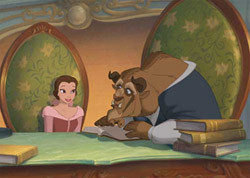 10) Beauty and the Beast
10) Beauty and the Beast
The only animated film to ever receive a Best Picture Oscar nomination, Beauty and the Beast came about as Disney returned to the very top of the game in the animation business with films that included The Little Mermaid, Aladdin and The Lion King. It was Beauty and the Beast, though, that really set the standard for excellent storytelling and technical wizardry. An adaptation of the Grimms fairy tale, the movie was remarkable for its dual protagonists. Belle, a young girl who likes to read and cares little for material things, is a bit of a mystery to her fellow townspeople, as they indicate in song:
Look, there she goes, a girl who's strange but special
A most peculiar mad'moiselle
It's a pity and a sin
She doesn't quite fit in
'Cause she really is a funny girl
A beauty but a funny girl
She really is a funny girl
That Belle
Meanwhile, in the mountain forest just past Belle's town lives the fearful beast of the title. When Belle's father happens upon the Beast's castle in a moment of need, the angry and embittered Beast takes him captive. Belle bravely sets off to search for him and despite finding the Beast horrifying and cruel, agrees to stay permanently at the castle if her father can be released. As time passes, though, something spectacular happens. Belle discovers that the Beast shares many of her interests, including a love for books that evidences itself in a massive library and a protective feeling for all who surround him. Perhaps there's more to this fearsome creature than meets the eye.
Belle and the Beast's romance is nicely counterbalanced by the villainy of Gaston, the boorish townsman who would have Belle for his wife simply for her beauty. All of the girls in town swoon over him, but he's nothing more than a slob who sees only what is on the exterior. Though the comparison between the two "beasts" is not precisely subtle (it's a children's movie, after all), the characterizations are delightful.
As for pure romance, the scene where Belle and the Beast dance in an ornate hall is one that will likely never be topped in the field of animation. And the continued theme of sacrifice for the ones we love is a worthy one that makes the movie timeless and meaningful. (Kim Hollis/BOP)
|
|
|
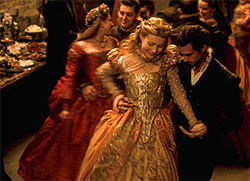 9) Shakespeare in Love
9) Shakespeare in Love
This film rightly garnered seven Academy awards, Best Actress (Gwyneth Paltrow), Best Supporting Actress (Judi Dench), and a justified win over Saving Private Ryan for Best Picture. Shakespeare in Love is a tragic romantic comedy, an Elizabethan drama replete with court intrigue, and a loosely historical, almost totally fictional, examination of The Bard's inspirations. Yet, for such a complicated set of stories, the movie is vibrant, energetic, and brilliantly clear. The love story between "Will" Shakespeare (Joseph Fiennes) and Viola De Lesseps (Paltrow) tears across the entire landscape of romantic movies. Their tale is ultimately doomed and tragic, yet surprisingly sweet and light. They love deeply and passionately, daring to put their own reputations – and even their lives – at risk in pursuit of the love they share. "This is not life, Will," Viola says. "It is a stolen season." The film is an exploration of love's greatest challenge: Can you fully immerse yourself in love and romance knowing fully that the one you love must leave you? Can we really abide by the old chestnut that it is better to have love and lost than to never have loved at all? And along the way, we're treated to a shockingly well-done film that handles comedy and tragedy, murder and intrigue, love and loss with a gentle touch and great insight. (Joel Corcoran/BOP)
"Are you the author of the plays of William Shakespeare? Then kiss me again for I am not mistook."
No one ever saw it coming. The Academy Awards were to be a coronation of Steven Spielberg's military masterpiece, Saving Private Ryan. Somewhere along the way, though, the tide turned. When the Best Picture prize was finally awarded, it was an overachieving John Madden title that carried the day. So how did the greatest Oscar upset of the modern era occur?
Don't let the cynics who argue it's the Weinstein Brothers' advertising that did the trick. In reality, Shakespeare in Love was the perfect counter to the impossibly dark Spielberg work. It's as light and fluffy as a marshmallow, a film I've often described as Feel Great rather than Feel Good. This is a warm hug of cinema, a timeless movie to be relished for generations to come. It offers a fictional re-imagining of the creation of "Romeo and Ethel the Pirate", a story where William Shakespeare (Joseph Fiennes) is a down on his luck womanizer. His life is changed forever when he meets a talented young actor prone to transvestitism. We've all been there, right?
When Shakespeare finds out it's the woman of his dreams, Viola (Gwyneth Paltrow), they embark upon a torrid love affair. The only dilemma involves her being expected to marry the nefarious but wealthy Lord Wessex (Colin Firth). Quirkily enough, the story is a mirror image of another top ten entrant, Moulin Rouge, save for the fact that Viola is a debutante rather than a prostitute. Both films share the same bittersweet ending as well, but I vastly prefer Shakespeare in Love as a movie due to the humor laced throughout. Accomplished actors Geoffrey Rush, Tom Wilkinson, Ben Affleck, Rupert Everett and Dame Judi Dench all offer comedic supporting turns which enhance the production. In the end, though, it's the off-the-charts chemistry between Fiennes and Paltrow which turns an otherwise strong romantic comedy into one of the ten best ever. (David Mumpower/BOP)
|
|
|
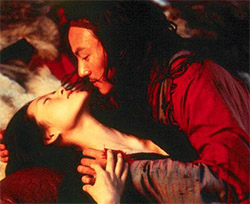 8) Crouching Tiger, Hidden Dragon
8) Crouching Tiger, Hidden Dragon
Love is the unexpected. Love is forbidden. Love is unrequited. Love is unspoken. In addition to describing an entire series of Danielle Steel novels (book spoilers: every couple gets together in the end), all of these statements are true of Crouching Tiger Hidden Dragon. Brokeback Mountain is currently getting all of the hype, but Ang Lee's superior work was this 2000 release's gripping tale of unfortunate souls crushed under the weight of romance.
Before going any further, let's address the obvious. Crouching Tiger Hidden Dragon is without question the least romantically titled selection on our list. It sounds like some sort of strange war game between the Ringling Bros./Barnum and Bailey clan and Gary Gygax's finest dice rollers. And perhaps appropriately enough, the most often discussed aspect of the movie is a battle for possession of The Green Destiny, a mystical sword of legend whose possessor is awarded great power. This sounds like generic Kung Fu Theater stuff rather than a major cinematic accomplishment of storytelling. In short, it's irrefutable proof that appearances may be deceiving. Cliché though it may sound, this title is a reinvention of the martial arts genre, proof that Eastern mysticism is more universal than Western audiences generally acknowledge.
In point of fact, the only accurate description of the plotline is Shakespearean. A hero of legend, Li Mu Bai (Chow Yun-Fat), is able to fend off any marauding bandits he encounters but he is still too afraid of his own emotions to speak the truth to the woman he loves, Shu Lien (Michelle Yeoh). The cavernous distance the non-couple has between them is in stark contrast to the other romance of the film. Princess Jen (Zhang Ziyi) faces mortal danger in the desert as feared kidnapper Dark Cloud imprisons her. Over time, though, Stockholm Syndrome develops, and Jen falls deeply in love with her oppressor. Their overwhelming passion is the polar opposite of the reserved tenderness shared by Li Mu Bai and Shu Lien. The underlying dynamic of youthful indiscretion versus mature, resonant emotional devotion offers the sort of poignant subtext modern cinema sorely lacks as a rule. Crouching Tiger Hidden Dragon is a moving exploration of the differences in what it means to be in love when you're young as opposed to as you grow older. (David Mumpower/BOP)
|
|
|
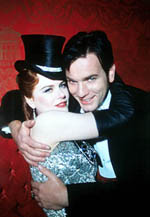 7) Moulin Rouge!
7) Moulin Rouge!
Moulin Rouge! essentially presented two of the greatest romantic operas ever written – La Boheme and La Traviata – to the MTV generation. While Puccini and Verdi were masters of the stage, Baz Luhrmann managed to pull off a masterful film rooted in the tradition of Italian grand opera: elaborate costumes, fanciful sets, and soaring music. Modern rock music is transported back to early 20th century Paris at the height of the Bohemian revolution. In Luhrmann's film, everyone just seems to live larger than we do, love more deeply than we do, and fall more tragically than we do. It is love and life on a grand scale painted with great, sloppy, vibrantly colored brushstrokes. Swirling camera work, soaring productions, and whirling dancers set the backdrop for the frantic (and, at times, desperate) romance between Christian (Ewan McGregor) and Satine (Nicole Kidman). The plot is complicated and sometimes doesn't make sense, but who really cares? The film is bizarrely diverse and sometimes just downright strange, but the love story centers all of the frenetic energy. The love between Christian and Satine provides clarity and focus in a tumultuous story and seems like an allegory for love in real life. Romance and courtship are confusing, bizarre, complicated, strange, and nerve-wracking, but at the center love echoes with a clear musical note that everyone can understand. And that is the central story of Moulin Rouge! (Joel Corcoran/BOP)
"The greatest thing you'll ever learn is just to love and be loved in return."
What more appropriate sentiment is there for a list of romantic films? And there are few movies that a plurality of the BOP staff is more passionate about than this Baz Luhrmann musical epic. Moulin Rouge! has it all – star-crossed lovers, grandiose musical numbers, sniveling villains and two of the prettiest lead performers ever set to celluloid.
The story isn't exactly your by-the-book romance. Christian (Ewan McGregor) is an innocent but optimistic young gent who has come to Paris to pursue a dream of being a writer. He takes up residence in the district of Montmartre, which also happens to be the location of the infamous Moulin Rouge, a cabaret whose courtesans are celebrated amongst men of upper-crust society. Their "sparkling diamond" is Satine (Nicole Kidman), a gorgeous performer who soon finds herself promised to a count who is believed to be a potential prime benefactor for the Moulin Rouge. The trouble is, in a case of mistaken identity, Satine falls for the idealistic Christian instead, setting in motion a series of events that ultimately lead to the tragedy foretold in the opening moments of the movie.
With regards to scenes full of romance, Moulin Rouge! is absolutely top-notch. Most notable among these, of course, is the Elephant Love Medley. Christian woos Satine with a variety of love songs, including All You Need is Love, Just One Night, In the Name of Love, Silly Love Songs, Love Lift Us Up Where We Belong and I Will Always Love You. And the elephant where the scene takes place itself is a metaphorical representation of the Indian symbol of sacred marriage.
Perhaps even more overwhelming in its romance is the climactic scene when Christian arrives on the scene to save Satine from the Duke's evil scheming. "Come what may, I will love you until my dying day!"
Moulin Rouge! is an absolutely frenetic, energizing celebration of love, music and art. Full of colorful metaphor and enough intrigue to carry a Shakespearean drama, it is indeed one of the most thoughtfully considered explorations of the notion of love that is only truly possible in fantasy. (Kim Hollis/BOP)
"How wonderful life is now you're in the world." Moulin Rouge is quite simply the most unabashedly romantic movie of recent years. Baz Luhrmann went all out with the risk that his romance could have come across as completely ridiculous and corny. (Some people might say that it did turn out corny, but those people have no soul.) Truth, beauty, freedom, and above all things love. That is Moulin Rouge. The biggest strength of the film is that the two leads Ewan McGregor and Nicole Kidman completely embrace the over the top earnestness that makes the movie special. The other stroke of genius is the use of classic love songs. They became classics for a reason and they provide a shorthand into the romance that brings you in quicker than any amount of dialogue could. But it's not just the classic songs that work. The original "Come What May" provides the line that gets me every time. "Suddenly my life doesn't seem such a waste. It all revolves around you." (Dan Krovich/BOP)
How Well Do You Know: Moulin Rouge!
|
|
|
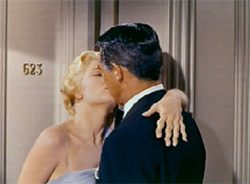 6) To Catch a Thief
6) To Catch a Thief
While I always appreciate Alfred Hitchcock as an auteur and one of the most stylish directors who ever worked in the realm of cinema, I believe that his best films were the ones that featured the resplendent Grace Kelly. Of the three films she did with the famed helmer, I prefer Rear Window, but we're not talking about thrillers this week. No, our topic is romance, and although To Catch a Thief contains a fair share of intrigue and mystery, its centerpiece is the sparks that fly between Kelly and Cary Grant.
Grant portrays John Robie, a former cat burglar who has retired from crime, but soon finds himself the prime suspect in a series of crimes taking place on the French Riviera. As he sets about trying to prove his innocence (and assisting an insurance investigator in his attempt to solve the crime), he encounters Frances Stevens, the lovely daughter of one of the vacationing noveaux riche. The chemistry between them is instantaneous, and the banter that they toss about is laced with innuendo and keen wit. Frances does become suspicious of John's motives (and justifiably so – he has lied to her about his identity and occupation), but that doesn't stop one of the iconic romantic scenes in movie history to occur. It may seem trite to those who have been watching romantic movies for years and years, but Hitchcock was the originator of the deep, heartfelt kiss that takes place against the backdrop of a massive fireworks display.
And yet, surprisingly enough, that's not even the film's climactic scene. That comes a fair ways later in the film, as John and Frances conspire to force the real criminal to reveal himself. The perceived heat between them plays heavily into their plans, and leads to an end scene that is giddy, humorous and altogether charming. Grant and Kelly really are among the best of the best. (Kim Hollis/BOP)
Whenever I am asked to name my favorite movie of all time, I inevitably receive the same awkward pause after I answer "To Catch a Thief." People look me up and down for a moment, trying to determine what my angle is. After all, a conformist would answer something stubbornly populist such as Star Wars, The Godfather or The Lord of the Rings: The Return of the King. Those are nice, safe answers that casual acquaintenances deem acceptable. A cinephile would mention some Eastern European film no one can pronounce or reference some arcane title from the dawn of movie making. It makes them sound smart for some reason I've never quite understood. Even a Hitchcock elitist would answer something more legendary such as Vertigo, Rear Window or Psycho. Those are his most lauded creations, the safe selections as it were.
I have no problem with any of the options offered above. It's merely that I don't see the point in lying about the topic. None of them is my favorite. What I love is a classic Hitchcock romance which oozes wit and starpower. The movie that moves me like no other is To Catch a Thief.
The timing is the key. Rarely did Hitchcock delve into the world of shameless commercialism, but he had reached a crossroads in his career after Dial M for Murder and Rear Window. It was time to do something lighter, an entire movie extension of the flirtatious scenes from Rear Window. To accomplish this, he was going to need the most debonair man in the acting world. So, the first step was to reunite with the star of his 1946 release, Notorious. Fortunately, Cary Grant was available after a couple of Howard Hawkes projects. Meanwhile, Grace Kelly was ready to follow up the raves she had received for Rear Window by proving once and for all that she was the archetype for the ice queen blonde bombshell Hitchcock preferred. They are, in my opinion, the greatest male and female stars in Hollywood's long and illustrious history. With them signed on, the stars had aligned literally and figuratively for To Catch a Thief.
All that was left was a screenplay, and that was a snap since David Dodge's novel of the same title was recently released. Dodge was a famous mystery writer whose quirky entry into the industry is a popular anecdote in publishing circles. He grew so frustrated with the lackluster novel he was reading that he bet his wife he could write a better mystery. From there, a franchise was born as James "Whit" Whitney's Death and Taxes became a huge hit in the 1940s. It was his Hitchcock work that has proven to be his most lasting contribution, though.
To Catch a Thief tells the story of a reformed thief and World War II veteran whose war buddies suspect he is up to his old tricks once more. As a series of heists occur across the French Riviera, an insurance adjuster arrives in time to figure out if he owes a payout to a victim. He also hopes to prevent another rich widow from losing her jewels to the man known as The Cat. That woman proves to be the mother of a headstrong, impossibly gorgeous daughter who finds herself drawn to the man under investigation for the crimes. And the sparks fly from there.
I referenced in the listing for Notting Hill that it had one of the two most romantic scenes in movie history. To Catch a Thief is the other, and it's the scene that has become more legendary than the movie itself. The couple fences with words as they sit on the couch of a suite overlooking the French Riviera. It's a dance with danger for Kelly's character, Frances Stevens, as she boldly celebrates her attraction to the bad boy. For Grant's character, John "The Cat" Robie, it's a battle against temptation as he resists the urge to allow himself to be seduced by the American debutante he refuses to let in. As the two finally give in to their temptation and celebrate the glory of the moment, fireworks explode in the background. This was a hallmark cinematographic accomplishment of its era that has been copied innumerable times in the half century since its release.
I have seen over 10,000 movies in my lifetime. I have never seen one with the romantic chemistry possessed between Cary Grant and Grace Kelly in To Catch A Thief. That alone justifies its presence as one of the ten most romantic movies of all time. (David Mumpower/BOP)
|
|
|
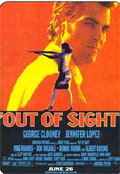 5) Out of Sight
5) Out of Sight
It is surprising, looking back on Stephen Soderbergh's Out of Sight, to realize how few scenes stars George Clooney and Jennifer Lopez appear in. I count three principal scenes in which Lopez and Clooney have substantive interaction: at the beginning of the movie when Clooney's Jack Foley has escaped from prison and jumps into the trunk of a car, taking Lopez's federal agent Karen Sisco with him; at the climax of the film, where Karen confronts Foley after at the scene of a robbery inside a mansion; and the pivotal scene, where the two meet up in the lounge of a Detroit hotel.
The scene begins as the two slip into adopted character roles, playing as though they are two strangers just having met, exchanging the kind of small talk you would expect to find in such a setting. The scene plays off an earlier one in which Karen coolly brushes off another lounge-dweller who has been hitting on her. But Soderbergh uses the beginning of the scene to establish the central point of the movie: that the identity of both Karen and Foley will not allow them to pursue any kind of relationship. He is a bank robber, she is the law. It's her job to try to catch Foley, it's his job not to get caught.
The two share an undeniable attraction. While the two share preciously little about themselves with each other, it is clear from the cramped confines of the getaway car's trunk that they ignite something within each other. While we don't understand the basis for their attraction - perhaps the characters don't, either - this consideration seems fairly unimportant. The attraction is there, and neither deny it.
Yet it does not really do either of the two any good. For every scene in the movie that the two share, there is another scene in which they experience each other only tangentially or in passing. There's an illicit phone call, a seemingly seductive encounter that turns out to only be a daydream, a passing glance across a hotel lobby as Jack narrowly escapes capture. The two seem to keep missing each other - and what if they do meet up? The fact that no relationship between the two is really possible is very apparent in the awkwardness following their sole lovemaking session. Both are too pragmatic to turn away from their role and their identity to be with each other.
So what makes Out of Sight a romantic movie? It's the fact that despite the reality that any relationship is impossible, the two cannot escape each other. Karen's pursuit of Jack goes beyond the call of duty. She knows he is in danger, that things cannot end well for him on the path he's following. The film emphasizes the fact that such a fundamental attraction perseveres despite any other practical concerns. And while practicality may prevent attraction from translating into relationship, the attraction will persist nonetheless. (Tony Kollath/BOP)
|
|
|
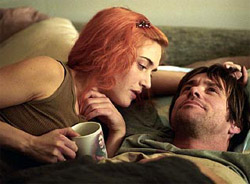 4) Eternal Sunshine of the Spotless Mind
4) Eternal Sunshine of the Spotless Mind
One of the most inventive films ever made, taking place almost entirely in the distorted memories of its protagonist, Eternal Sunshine of the Spotless Mind offers up the deceptively simple scenario: if you could erase a bad relationship from your memory, would you? What would it mean if you could make it so your mistakes never happened?
Michel Gondry, working from a Charlie Kaufman script, takes us through the process of erasing Joel Barish's (played by Jim Carrey) memories of his relationship with one Clementine (Kate Winslet), a temptress with multi-colored hair and a life-sized personality. Through the procedure, all traces of her would be erased forever, but in the middle of it, Joel's subconscious realizes that there are some memories he wants to hang on to. In trying to hide these memories, he starts to realize just where he's gone wrong in his relationships, but is it then too late? None of it's going to remain.
And there's the rub that Kaufman and Gondry would point out, that we need to be able to learn from our mistakes in order to grow, and heartbreak, as painful as it is, is necessary. Without it, what good is love? And without that, are we doomed to repeat those mistakes? Through the trippy and endlessly illuminating journey skipping around his memories from his entire life, we find out that both the highs and lows matter.
Carrey is simply brilliant here, in the umpteenth role where he downplays his typical manic persona (seriously, give him his Oscar nomination already) and Winslet is near perfect as the woman that drives him nuts. But then, it's a fine line between that and passion. It might be cliché at this point, but this film makes it perfectly clear that the only thing worse than being hated is being forgotten. (Reagen Sulewski/BOP)
"It's better to have loved and lost, than never to have loved at all." Eternal Sunshine of the Spotless Mind puts that expression to the test. Joel and Clementine meet cute and fall in love, but their relationship ends badly, so badly that Clementine pays to have all memories of Joel erased from her mind. When Joel finds out, his reaction is to have the same procedure himself to have memories of her removed. However, when the procedure begins, Joel desperately clings to his memories of his past relationship. What is most unique about Eternal Sunshine as a romantic movie is that it is about a failed relationship. The beauty is that the movie admits that even a relationship that doesn't end with happily ever after can leave you with some of your most cherished memories. It celebrates the moments that can stay with you forever even if the relationship doesn't. (Dan Krovich/BOP)
|
|
|
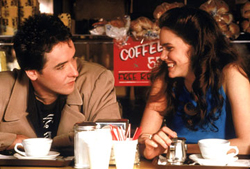 3) Say Anything...
3) Say Anything...
This movie is the greatest love story to have been filmed in my lifetime.
I've sung its praises many, many times before on this site. It was previously the top film on our list of best movies of the 1980s, and I also had the opportunity to list it as one of the best DVD releases of 2002.
What makes Say Anything... so special?
It's Lloyd Dobler, of course. He's the kind of guy every girl dreams of meeting at some point in life – a keeper. Not content to follow the trajectory expected of him, Lloyd walks his own singular path. He aspires to be a famous kickboxer, believing that it will be the sport of the future (never mind that he was wrong and it turned out to be snowboarding instead). He calmly refuses to sell out his principles. And when it comes to wooing his dream girl, Diane Court, his determination carries him through even though all of his friends tell him that such a pursuit would be fruitless.
As for Diane Court, she's an absolute dream – though perhaps not the typical female lead that is so prevalent in romances. She's self-reliant, beautiful and the smartest girl in her high school class – so smart, in fact, that she has obtained a highly prestigious fellowship to study in England. Her brains make her intimidating to the point that few guys have ever had the courage to approach her.
And yet, Lloyd instinctively understands Diane. When he takes her out on their first date (a graduation party), he lets her keep to herself as much as she needs, checking in occasionally, but giving her the opportunity to shine on her own. After the evening ends (and Lloyd has kindly taken a drunk young man home), Lloyd attends to Diane's safety by pointing out some broken glass. When she asks him to come work alongside her at her father's nursing home, Lloyd overcomes what seems to be a fear of the elderly – simply because he wants to be with Diane. And when Diane's super-protective father asks Lloyd what his plans for the future are, the young man's answer is, ""What I really want to do - what I want to do for a living - is I want to be with your daughter. I'm good at it."
It is the closeness between Diane and her father - and Mr. Court's eventual downfall - that drives a wedge in between Lloyd and his beloved. Confused and erratic, Diane tells Lloyd that they will have to go on simply as friends. Lloyd finds this solution unacceptable, and after his "eighth and final phone call", resorts to one of the grandest romantic moments ever seen in cinematic history – one that is so elegant in its simplicity that it has become iconic in its own right. He drives to Diane's house and stands outside her window with a boombox held over his head, playing the song that was on the radio the first time they made love – Peter Gabriel's In Your Eyes. It's a perfect example of director Cameron Crowe's canny instinct for choosing precisely the right music for exactly the right moment.
Diane and Lloyd cannot remain apart because as I noted at the beginning, he's a keeper. When she sets off on her grand journey to England, he is by her side. Diane is terrified of flying, but he tells her that once the "fasten seat belt" sign goes off, everything will be fine. The movie ends with the bell that indicates precisely that – offering an upbeat, hopeful future for our young lovers. (Kim Hollis/BOP)
How Well Do You Know: Say Anything....
|
|
|
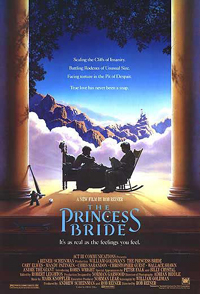 2) The Princess Bride
2) The Princess Bride
This movie includes the best fairy tale romance ever put down on film. Period. And not just the light-hearted fairy tale of those Golden Books you used to read, but the fundamental and elemental fairy tale rooted in the original Brothers Grimm with all the darkness, anger, and violence of life. Almost 20-years-old, the movie provides the very definition of "timeless." Rob Reiner's film is both parody and reality, a reminder that "life is pain, Highness. Anyone who says differently is selling something," but also an invigorating love story.
Westley and Buttercup are two people in love who must face their own human frailties, a malicious swamp, Rodents of Unusual Size, scheming nobility, and even death. While we won't spoil the ending, it does end happily like any fairy tale should. But in this particularly good fairy tale, we encounter some truly dark ideas and thoughts. For example, the traditional Hollywood-esque fairy tale depiction of love rests on the idea of noble self-sacrifice. The hero or heroine turns away from the love they share because pursuing it will lead to the other person's death.
But The Princess Bride presents a different take – seeming self-sacrifice to save the life of a lover just might be a form of ultimate selfishness. A wizened old crone confronts Buttercup after she turns away from Westley to save his life. "Boo!" the old crone shouts, "Boo! You had love in your hands, and you gave it up!" Buttercup protests, "But they would have killed Westley if I hadn't done it!" But the old crone presses on with "Your true love lives and you marry another!" She then turns to the assembled crowd with "True love saved her in the Fire Swamp, and she treated it like garbage. And that's what she is, the Queen of Refuse! So, bow down to her if you want. Bow to her. Bow to the Queen of Slime, the Queen of Filth, the Queen of Putrescence." Harsh words, yet truthful. The crone reminds us that love does not mean deciding the fate of another in any respect, even if pursuit of that love means death. And the Princess Bride offers many more crystal clear insights into the nature of love, along with great swordplay, high drama, and an exposition on betting with Sicilians when death is on the line. Great stuff if you ask me. (Joel Corcoran/BOP)
"My love is like a storybook story. But it's as real as the feelings I feel."
How does a person describe purity? That's the challenge in explaining the joy of The Princess Bride. Rare is the children's film that allows for an entire family to sit in a room and enjoy the same spectacle for the same reason. The Princess Bride is not a Shrek-like film where the in-jokes appeal to grown-ups while the kids dig the funny donkey. This is something different, something special...something to be treasured.
The Princess Bride is a fantasy tale about a boy named Westley who isn't good enough for the princess he loves. So, he goes off to make his mark on the world. After a time, word comes down that he has been lost, fallen victim to the Dread Pirate Roberts. The woman he loved, Buttercup, mourns him every day. Eventually, she is able to confront her beloved's tormentor. After the masked bandit realizes the sincerity of her loss, he reveals himself to be the very Westley she thought dead. Their blissful reunion is not without its trials and tribulations as the duo must overcome a weapons master with a grudge, Rodents of Unusual Size, and a menacing prince who refuses to cede his betrothed to a poor farm boy. Such is the stuff of myth and legend.
Gifted writer (and personal favorite) William Goldman has stated on several occasions that this story is an amalgam of the bedside tapestries he used to weave for his children. He has expressed regret more than once about the fact that he never wrote down more of the ideas, because so many other great Princess Bride/Dread Pirate Roberts/Inigo Montoya tales have been lost to the ether. Forget the disappearance of JD Salinger. This revelation is the biggest blow to modern literature. To think that we have all missed out on an entire franchise of Princess Bride tales is too depressing a thought to consider for long. We may, however, take solace in the fact that we have this one perfect movie romance to fill the void.
Final free advice for our readers: buy the soundtrack. You won't regret it. (David Mumpower/BOP)
How Well Do You Know: The Princess Bride
|
|
|
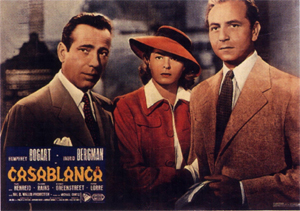 1) Casablanca
1) Casablanca
Another entry in the star-crossed lovers category, Casablanca finds its foundation against the very real backdrop of World War II. Rick (Humphrey Bogart) is the embittered, caustic owner of the hot nightspot in Casablanca whose cozy, cynical existence is thrown into turmoil when Ilsa (Ingrid Bergman), the long-lost love of his life, arrives in town with her new husband. It just so happens that this husband is one Victor Lazlo (Paul Henreid), underground leader of the Czech Republic and great hope for the future. They ask for Rick to help them in obtaining some letters of transit so that they might leave the country, but Rick is cruel to Ilsa, believing that she left him high and dry in Paris. Soon, however, he learns that her reasons for doing so were justifiable. Rick and Ilsa are soon planning to take flight themselves.
Trouble is, despite the acrimonious front Rick tries to display, he is a good man. He realizes that if he takes Ilsa away from Victor, the great man's work will be for naught and she will in time come to resent him for it. And so it is that Rick sacrifices his own happiness for that of Ilsa, Victor and potentially an entire nation of people. His sacrifice is illustrated as he tells her, "Where I'm going, you can't follow. What I've got to do, you can't be any part of. Ilsa, I'm no good at being noble, but it doesn't take much to see that the problems of three little people don't amount to a hill of beans in this crazy world. Someday you'll understand that. Now, now... Here's looking at you kid." It's the ultimate example of giving up one's dreams with the full knowledge that all that will follow is a painful future and an enduring feeling of loss. But Rick's love for Ilsa will carry on because "they'll always have Paris." And we'll always have Casablanca. (Kim Hollis/BOP)
Forget just thinking about romantic movies; Casablanca is one of the best movies of all time, period. It is filled with many wonderful performances - and not just the leads, but also folks like Paul Henreid as Laszlo, Dooley Wilson as Sam, Peter Lorre as Ugarte, and the best of them all: Claude Rains as Captain Renault. The dialogue is crisp, the scenery and atmosphere is top-notch, the music is just right, and there are plenty of thrills too. But, make no mistake; this is first and foremost for the romantics. It is pretty much the ideal date movie.
There are an almost countless number of wonderful moments in the movie, nearly any one of which could be someone's personal favorite. I'm partial to the ending though. It's a seamless, taut, ending that plays no small part in Casablanca often being referred to as "the greatest screenplay ever written." It somehow manages to be both sad (in a sentimental, teary-eyed broken love sort of way) and happy (by being hopeful for the future, and thankful for the past) at the same time. And I wouldn't change a thing about it.
I envy those of you who have yet to experience the magic for the first time. (Now what are you waiting for?!? Netflix awaits!) (Michael Bentley/BOP)
How Well Do You Know: Casablanca
|
|
|
|
|
|
|

